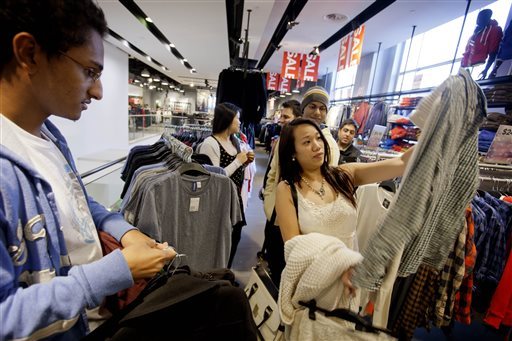It’s good that retailers like L.L. Bean are pledging to do more to ensure that working conditions at their overseas contractors’ plants are better than those at the factory in Bangladesh that collapsed last week, killing more than 600 workers.
But it shouldn’t end there. American consumers also should get involved. As long as the demand for low-price goods outweighs any concern for worker safety, unscrupulous manufacturers will consider disasters like this to be part of the cost of doing business.
Bangladesh is one of the poorest countries in the world, as well as the second biggest exporter of clothing, after China.
The garment industry employs 3.6 million workers, but it doesn’t pay them much at all. Many of the workers who died in the collapse of the eight-story Rana complex were earning only $40 a month.
Wages were not the only place the plant’s owners scrimped. Preliminary reports say the building was made of weak materials, including substandard iron rods. When a power outage caused management to turn on generators, their vibration, along with the vibration of thousands of sewing machines, made the building fall down.
As shocking as this disaster was, it is not an isolated incident. Just six months ago, 112 workers died in a catastrophic fire in another Bangladesh factory.
The Walt Disney Co. announced it would pull out of Bangladesh and stop licensing products made there. That is easy for Disney (only 1 percent of its products came from Bangladesh), but that alone is not going to improve conditions. A better approach would be for companies to stay in places like Bangladesh and work with monitors who inspect working conditions. Their findings should be shared with consumers who are trying to decide how to spend their money.
If Americans refuse to buy products made by what is essentially slave labor, companies like L.L. Bean could do more good by staying in Bangladesh than pulling out.
It’s up to all of us to decide whether it’s better to buy a product from an unknown location or pay a little more for one whose origins have been certified sweatshop-free. Sometimes the cheapest product isn’t worth the cost.
Send questions/comments to the editors.



Success. Please wait for the page to reload. If the page does not reload within 5 seconds, please refresh the page.
Enter your email and password to access comments.
Hi, to comment on stories you must . This profile is in addition to your subscription and website login.
Already have a commenting profile? .
Invalid username/password.
Please check your email to confirm and complete your registration.
Only subscribers are eligible to post comments. Please subscribe or login first for digital access. Here’s why.
Use the form below to reset your password. When you've submitted your account email, we will send an email with a reset code.